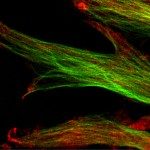Link to Pubmed [PMID] – 28667611
Methods Mol. Biol. 2017;1615:159-176
The bacterial two-hybrid (BACTH, for “Bacterial Adenylate Cyclase-Based Two-Hybrid”) system is a simple and fast genetic approach to detecting and characterizing protein-protein interactions in vivo. This system is based on the interaction-mediated reconstitution of a cyclic adenosine monophosphate (cAMP) signaling cascade in Escherichia coli. As BACTH uses a diffusible cAMP messenger molecule, the physical association between the two interacting chimeric proteins can be spatially separated from the transcription activation readout, and therefore it is possible to analyze protein-protein interactions that occur either in the cytosol or at the inner membrane level as well as those that involve DNA-binding proteins. Moreover, proteins of bacterial origin can be studied in an environment similar (or identical) to their native one. The BACTH system may thus permit a simultaneous functional analysis of proteins of interest-provided the hybrid proteins retain their activity and their association state. This chapter describes the principle of the BACTH genetic system and the general procedures to study protein-protein interactions in vivo in E. coli.



